Featured Topics
Featured Products
Events
S&P Global Offerings
Featured Topics
Featured Products
Events
S&P Global Offerings
Featured Topics
Featured Products
Events
S&P Global Offerings
Featured Topics
Featured Products
Events
Language
Featured Products
Ratings & Benchmarks
By Topic
Market Insights
About S&P Global
Corporate Responsibility
Culture & Engagement
Featured Products
Ratings & Benchmarks
By Topic
Market Insights
About S&P Global
Corporate Responsibility
Culture & Engagement
S&P Global — 6 Jan, 2021
By S&P Global
Subscribe on LinkedIn to be notified of each new Daily Update—a curated selection of essential intelligence on financial markets and the global economy from S&P Global. The S&P Global Daily Update will take a break over the holidays and return on January 4, 2021.
Although the unprecedented tumult of 2020 has ended, the extraordinary events of the year will continue to reverberate around the world for at least six months and likely shape the decade ahead.
"People, in many ways, feel like they've seen all the major risks you can see with the pandemic," Bilal Hafeez, CEO at independent research house Macro Hive and a former chief analyst at Nomura and Deutsche Bank, said in an interview with S&P Global Market Intelligence about potential market shocks to come in 2021. "They're losing sight of all the other potential risks."
Because the health of the global economy is predicated on the health of the global population, the short- and long-term outlooks for 2021 are balanced against the effectiveness of countries’ vaccination strategies in light of sputtering economic recoveries, spiraling geopolitical tensions and transformations, and skyrocketing coronavirus cases. Inoculations have begun to roll out in several countries—where leaders are navigating the social, financial, and economic effects of this crisis.
Months after the November U.S. presidential election and just two weeks away from his transition out of power, U.S. President Donald Trump is pressuring members of his party to overturn the result of the race that was won by Joe Biden, while the country remains paralyzed by the pandemic with a slow vaccine rollout. Across the world, one in every 50 Britons, or 1 million people across the U.K., are currently infected with the coronavirus, according to Prime Minister Boris Johnson. The prime minister has placed the country in a last-minute third lockdown in an attempt to contain a new, highly-transmissible coronavirus variant. Elsewhere, emerging market economies in Latin America remain vulnerable to the implications of additional waves of infections. As these nations’ governments don’t have much capacity to deploy additional fiscal support, banks could buckle under the burdens of humongous provisions against loan losses, and the existing economic and financial scars may never fully heal.
If the virus continues to spread and vaccine rollouts are delayed, global economic growth could be limited to 1.6% this year, according to the World Bank’s latest semiannual report. Despite the pathway to a post-pandemic world made possible by vaccine developments, the pandemic and its aftermath will dominate credit conditions in the short-term. This focus will remain even after the crisis is contained, when the global community shifts to tackling the social, economic, and credit implications of the gradual easing of stimulus measures, according to S&P Global Ratings.
“Our central assumption remains that COVID-19 will come under control very gradually through a combination of vaccines, medical treatments, and testing starting from Q2 in developed economies, but more broadly only in the second half of the year,” S&P Global Ratings’ Global Head of Research Alexandra Dimitrijevic and Senior Director of Global Research Gareth Williams said in their global credit outlook for 2021. “This should allow for many social-distancing measures to be lifted, a resumption of international travel, and a rebound in private demand. At that point, governments may be able to gradually phase out extraordinary fiscal support. Central banks are likely to keep interest rates exceptionally low and continue to offer liquidity support as necessary.”
Shifting back to austerity measures may not be the solution in the long-term. The Organization for Economic Co-operation and Development (OECD) has encouraged countries to reconsider their approaches to previous financial crises.
Explaining that countries should “get out of the mindset that we have one-size-fits-all fiscal rules to get debt back to a target,” OECD Chief Economist Laurence Boone told the Financial Times this week that “the first lesson is to make sure governments are not tightening in the one to two years following the trough of GDP” because “the mistake that we made was not a lack of stimulus during the trough in 2009 . . . the mistake came later in 2010, 2011 and so on, and that was true on both sides of the Atlantic.”
Today is Wednesday, January 6, 2021, and here is today’s essential intelligence.
Outlook For U.S. States: Symptoms Persist, But a Shot in the Arm Could Lead to Growth
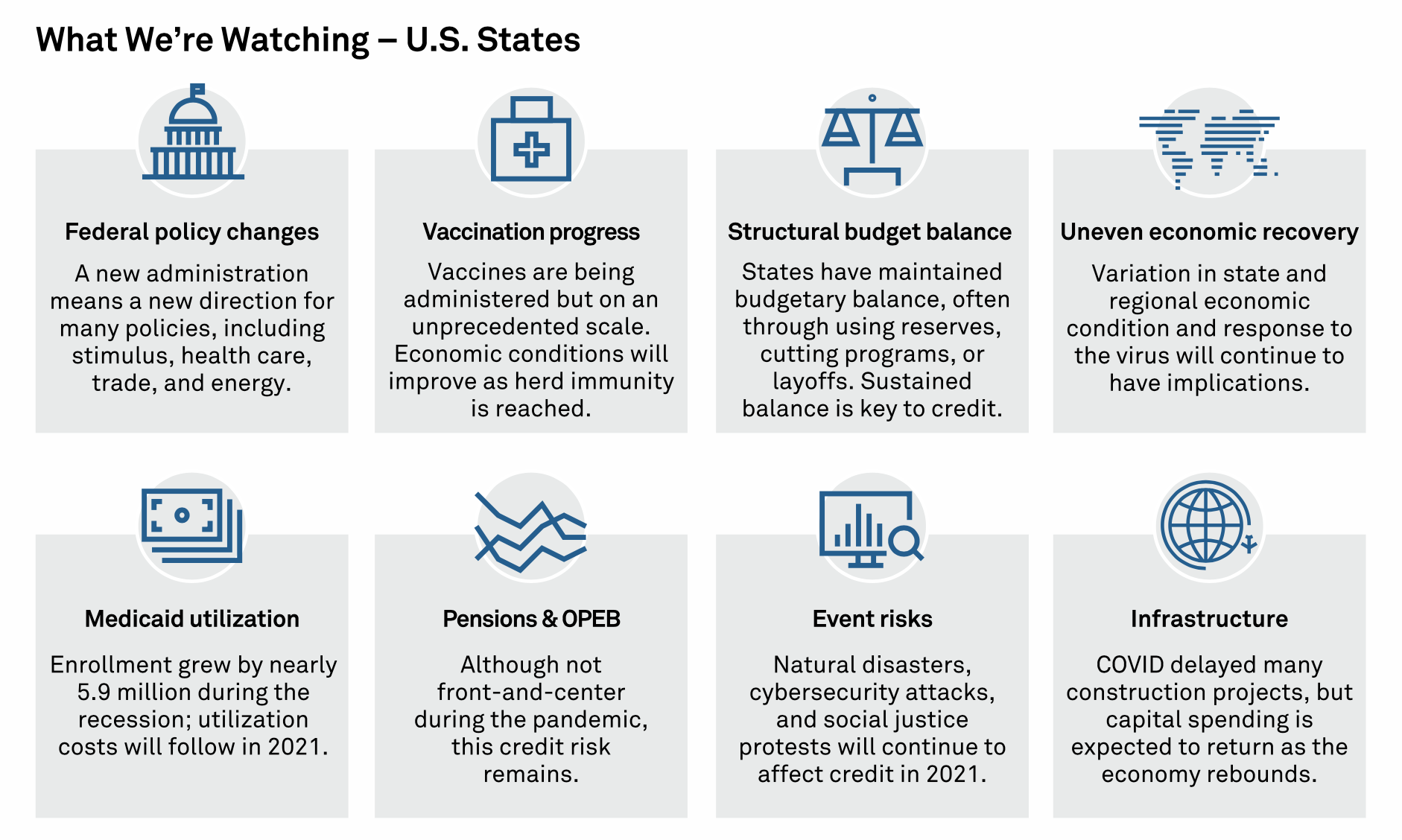
Although signs of a recovery have begun to take hold with the approval of vaccines and the stabilizing of certain revenues, many headwinds will continue to bear down on state credit stability in 2021.
—Read the full report from S&P Global Ratings
U.S. Leveraged Loans Gain 1.35% In December 2020, 3.12% in 2020 After Q4 Rebound
The S&P/LSTA Leveraged Loan Index gained 0.77% in the first seven weeks of the year, followed by an unprecedented 20.7% loss in the four weeks from Feb. 23 through March 23, at the onset of the coronavirus pandemic. After hitting bottom on March 23, however, the $1.2 trillion asset class has climbed steadily, gaining almost 29%. As a result, loans posted a 3.12% return for 2020 overall — an impressive achievement considering that the market was in the red for most of the year.
—Read the full article from S&P Global Market Intelligence
U.S. Corporate Bankruptcies End 2020 at 10-Year High Amid COVID-19 Pandemic
U.S. corporate bankruptcies reached their worst levels in 10 years in 2020 as the coronavirus pandemic upended global industries and struggling companies faced their breaking points.
—Read the full article from S&P Global Market Intelligence
Driven by Big Tech's Pandemic Gains, S&P 500's 2020 Surge Masks Uneven Recovery
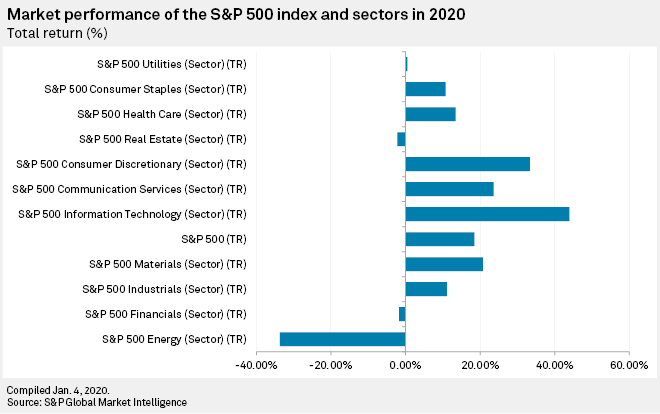
Despite repeated surges in coronavirus cases and a dim labor market, the massive gains by a few big stocks pushed the S&P 500 to record after record in 2020 and an 18.4% gain for the year on a total-return basis.
—Read the full article from S&P Global Market Intelligence
A Global Macro Look Back at Commodities in 2020
Over the past 50 years, commodities have displayed mostly positive yearly performances, as measured by the world-production-weighted S&P GSCI. The index rose in 34 out of those 50 years, or roughly 70% of the time. In 2020, the S&P GSCI fell 24%, pulled down by the worst-performing energy commodities.
—Read the full article from S&P Dow Jones Indices
Persistence
Market history tells us that selling can be most damaging precisely when it’s most tempting. The key to success in 2020 was resisting the urge to panic when panic seemed like the most reasonable path.
—Read the full article from S&P Dow Jones Indices
Global Investment Banks' Revenue to Remain Elevated In 2021 But Below 2020 Highs
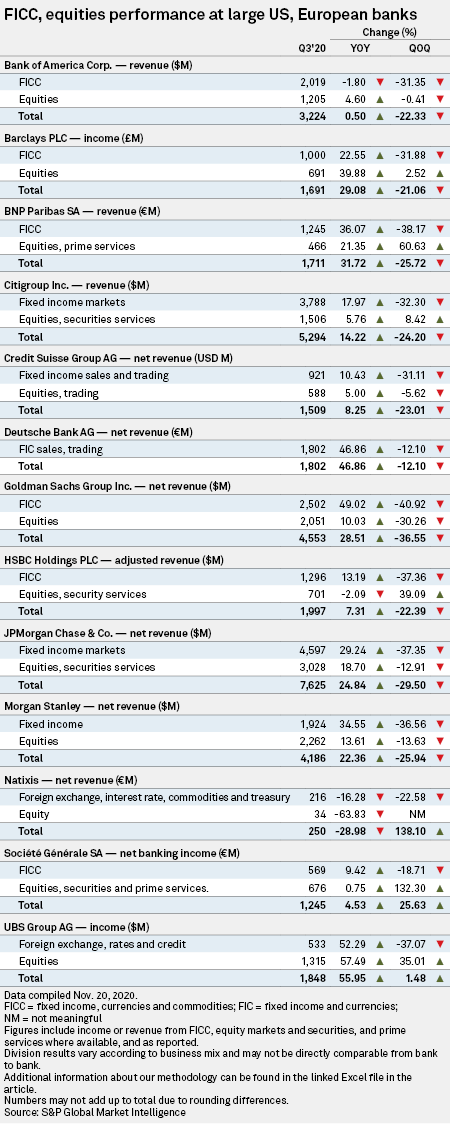
The world's largest investment banks are on track to book record trading revenue in 2020 as COVID-19 triggered capital market volatility not experienced in more than a decade, but analysts expect growth to taper off in 2021.
—Read the full article from S&P Global Market Intelligence
Filipino Boxing Champ Manny Pacquiao Seeks to Pack Fintech Punch
World boxing star Manny Pacquiao, whose sporting career has cooled amid the coronavirus pandemic, is hoping to turn his celebrity status in the Philippines and beyond into commercial success for his two financial technology ventures in an increasingly crowded market.
—Read the full article from S&P Global Market Intelligence
Japan's Latest Push For Workforce Diversity Challenges Megabank Culture
Japan's latest policy push for more workforce diversity in terms of gender, ethnicity and employment background touches a nerve of the deep-seated culture of the nation's megabanks: male domination and lifetime employment.
—Read the full article from S&P Global Market Intelligence
Amazon's New Pharmacy May Steal Market Share From CVS, Walgreens Amid Pandemic
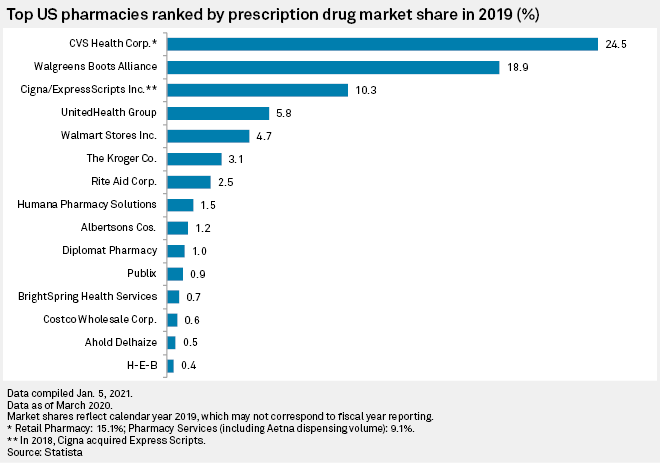
Amazon.com Inc.'s move to launch an online pharmacy during the pandemic could help it squeeze market share away from competitors including CVS Health Corp. as the e-commerce giant accelerates efforts to delve further into the healthcare arena, health and company experts say.
—Read the full article from S&P Global Market Intelligence
ESG Pulse: Reimagining Accounting to Measure Climate Change Risks
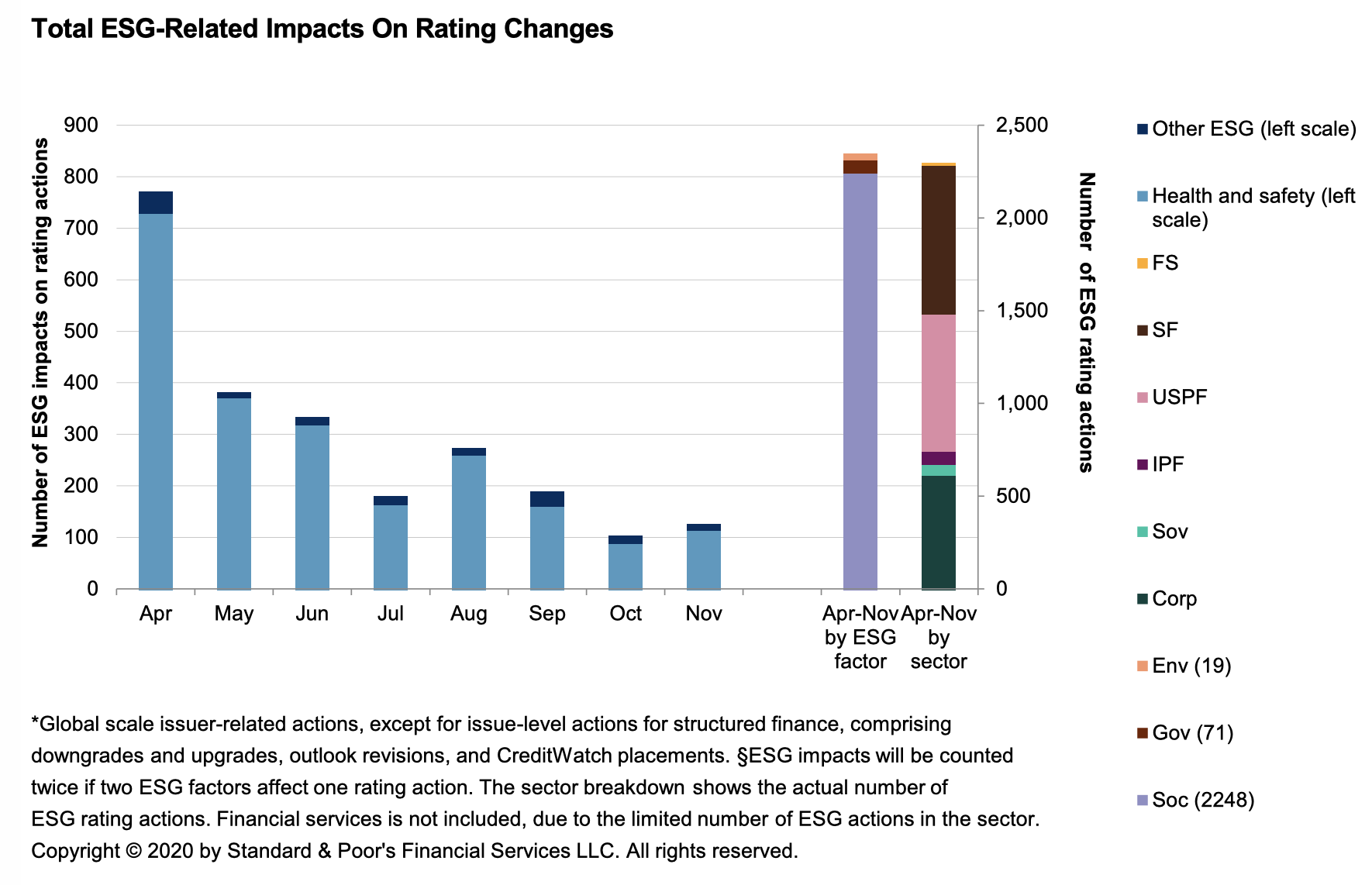
ESG-related rating actions fell to about 100 per month in October and November, from a monthly average of 200 from July to September. This brings the total number of ESG-related rating actions during April-November to nearly 2,300.
—Read the full report from S&P Global Ratings
Wind-Turbine Makers See Hope in Climate, Recovery Plans After 2020 Disruption
A year of coronavirus-related disruption and corporate restructurings in 2020 has changed the landscape for wind turbine manufacturing. The pandemic has been challenging for a sector heavily reliant on functioning international supply chains, but manufacturers were able to largely shake off the disruption of the initial lockdowns earlier in the year. More recently, ramped-up renewables targets and green recovery plans across Europe have brightened the long-term outlook.
—Read the full article from S&P Global Market Intelligence
Tesla Vehicle Deliveries Climb 36% in 2020
Electric vehicle maker Tesla delivered 499,550 vehicles in 2020, rising 36% year on year, according to the company's latest quarterly report.
—Read the full article from S&P Global Platts
New Members of US Congress Include Climate Defenders, Carbon Tax Opponents
U.S. congressional leaders have yet to announce committee rosters for the newly launched 117th Congress, but several freshman members will bring energy and climate change-related experience that could shape policy in the next two years regardless of their committee assignments.
—Read the full article from S&P Global Market Intelligence
Listen: Exploring Distro: Rotterdam Port’s New High-Frequency Trading Platform
In the latest Platts Future Energy podcast, Janjoost Jullens, Energy Lead at the at the Blocklab innovation lab in the Netherlands, and James Rilett, Senior Director of Innovation at S&P Global Platts, tell Henry Edwardes-Evans about Platts AI trading platform Distro.
—Listen and subscribe to Platts Future Energy, a podcast from S&P Global Platts
Saudi Arabia announces unilateral output cut, surprises market, OPEC+
Saudi Arabia delivered what Russian Deputy Prime Minister Alexander Novak called "a New Year's gift" to the oil market with its surprise announcement that it will cut oil production by an extra 1 million barrels per day, blowing away expectations that the OPEC+ alliance would maintain its collective output ceiling.
—Read the full article from S&P Global Platts
Written and compiled by Molly Mintz.
Content Type
Location
Language